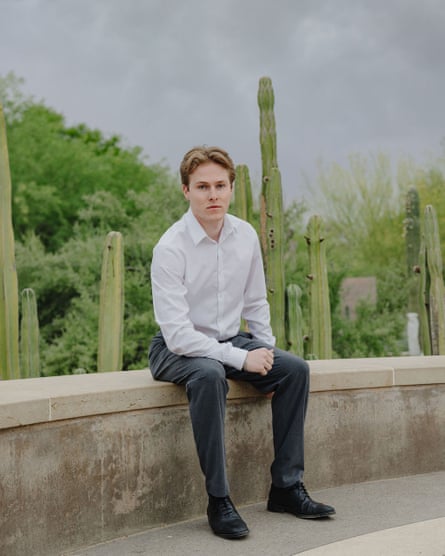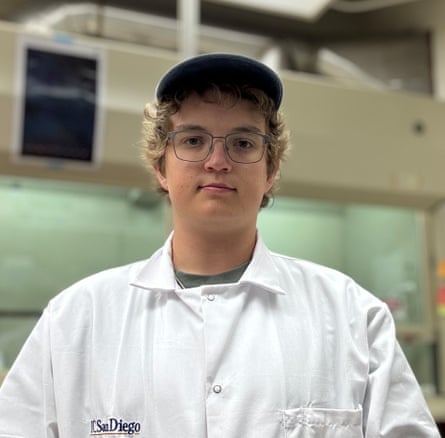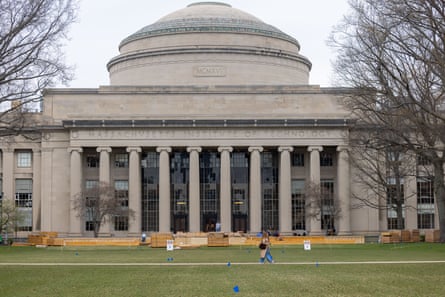
Eric Schuster was over the moon when he landed a lab assistant position in a coral reef biology lab at the Scripps Institute of Oceanography (SIO). The 23-year-old had recently graduated with a bachelor’s degree in nanoengineering from the University of California, San Diego, into a fiercely competitive job market. He felt like he’d struck gold.
But the relentless cuts to scientific research and attacks on higher education by the Trump administration have turned what felt like a promising academic future into unstable ground.
“There are several labs, both at our institution and around the US, that have essentially just sent everyone home because they have no money,” Schuster said, expressing concern not just for oceanography but for all fields of scientific research. The multi-pronged attacks have “been seriously detrimental to just about everyone”, he said.
Though Schuster is grateful for his position, he is in a constant state of worry about whether it will still exist tomorrow. UCSD, which SIO is a part of, told the Guardian that the Trump administration has ended or frozen roughly $90m in grants from the National Institutes of Health and the National Science Foundation. Nearly 200 other grants are facing delays. SIO researchers have noted that the “vast majority” of their funding comes from the government.
Schuster has decided he’s not going to stick around to see if he will lose his job.

He’ll be starting his graduate studies this fall in France with a European University Networks (EUN) program, a transnational alliance of higher education institutions. He plans to stay outside of the US after to continue his career.
“It’s a grab bag that anyone you’re talking to has had decreased funding, or lost almost all of their funding, or is having trouble continuing their funding,” he says.
“That, along with the pretty pervasive and growing anti-science establishment narrative … have been strong motivators to look elsewhere,” Schuster said.
Schuster is one of many budding academics reflecting what could become a significant American brain drain, sending the brightest minds in the country to flee the US and take their scholarly endeavors elsewhere. Historically, the US has attracted top talent from around the world, but the moves by the Trump administration may have reversed these conditions in record time.
Research institutions are feeling the strain from funding cuts from some of the biggest grant-making bodies in the world. The National Science Foundation (NSF) funds about 25% of federally backed basic research at US universities, but Trump’s proposed budget would cut over $5bn, or 57%, from its budget, chopping it from roughly $9bn down to $3.9bn. The US National Institutes of Health would lose about 40% of its budget compared to last year.
But those cuts aren’t the only cause for anxiety. Nerves throughout the scholarly community are also on edge given what is widely perceived as a historic attack on academic freedom through administration assaults against universities such Columbia and Harvard University under the guise of rooting out antisemitism and diversity, equity and inclusion programs. Dozens more universities are waiting for their turn.
‘The situation is just too volatile’
A recent Nature survey revealed that approximately 75% of US-based scientists are contemplating relocation, with early-career researchers and PhD students particularly inclined toward opportunities in Canada, Europe and Australia.
Valerio Francioni is one of them. A 32-year-old Italian citizen who moved to the US after getting his PhD at the University of Edinburgh, Francioni is now a postdoctoral research scientist at the Massachusetts Institute of Technology studying neuroscience.
International students have faced nonstop chaos in the past few months, from visa suspensions to the attempted deportations of several students who expressed support for Palestinians. Last month, the Trump administration ordered US embassies worldwide to immediately stop scheduling visa interviews for foreign students as it prepares to implement comprehensive “social media screenings” for all international applicants.

“As an international, there’s just no way that you can invest safely into a career here right now, there’s just no way to plan ahead. The situation is just too volatile to feel that you’re making a safe investment by being here,” Francioni said.
A recent report from the Economist suggests that international students (and some domestic) are losing interest in American PhD programs. Searches for US PhD programs on the website FindAPhD fell 40% year on year in April, while interest from students in Europe has fallen by 50%. Data from another website, Studyportals, shows a decrease in interest for domestic PhDs among Americans, and a rise in interest for international programs compared to the previous year.
Though his own visa has not been affected yet, Francioni plans to leave the US once his run at MIT is finished. He had wanted to stay in Boston – it’s a great place for people in the neurotech field, he says, and his American partner is there. But his calculus has changed in the past few months.
Kristina, originally from Sweden, is grappling with the same questions. A mathematics professor at a university in the north-east US, Kristina requested that only her first name be used and her institution not be named over concerns of retaliation by the Trump administration.
“Right now, I think that everyone who’s not a citizen feels that we cannot express our opinions,” Kristina said.
She’s been in the US for 25 years, but does not have US citizenship. She is now debating whether to stay or leave. To her, the question is a moral one, whether to leave for safety or stay to “fight for a more democratic future”.

Emmanuel Guerisoli, a French and Italian academic with a PhD in sociology and history, moved to the US in 2010 to pursue a masters in sociology. He is now finishing a postdoc at the Zolberg Institute on Migration and Mobility at the New School.
Guerisoli is concerned about being targeted by Ice because of discussions he has led in class on the war in Gaza. He was offered a tenure-track position at a different institution, he said, but it was quickly rescinded, which he was told was due to the Trump administration’s funding cuts.
He gave up on applying to academic jobs in the US and decided to move to Argentina this summer, where the dread of Immigration and Customs Enforcement (Ice) agents knocking down his door will not follow him every day.
“It’s not just that you’re being questioned on your political beliefs, but any type of critical or academic engagement on certain topics that go beyond the realm of just politics are being targeted,” he said.
“Even if the state department renews my visa, I would be concerned about teaching courses the way I have done it in the past,” he said.
Filling the void
Scholars at Risk, which assists academics facing political pressure, saw this coming.
“The recent policies have created a tremendous amount of anxiety,” Robert Quinn, the group’s executive director, said. He worries the loss will have ripple effects far beyond campus.
“When a big economic contributor gets disrupted, that’s going to begin to affect everybody relatively quickly in those communities,” Quinn said. “Beyond that is the effect on public health. If we look at the cutting of the research pipeline, that means fundamentally cutting off access to services and medicines and treatments that affect every American who happens to get sick.”
Quinn says that Scholars at Risk is working on ways to support US academics exploring foreign opportunities.
Several other countries are jumping in to fill the void, and have already begun courting American academics.
The European Union has pledged €500m (around $556m) over the next two years to become a prime destination for displaced scientists. France’s president, Emmanuel Macron, announced $113m for a national program to bring in American researchers, and Aix-Marseille University separately announced Safe Place for Science, a three-year, $16.8m program to attract 15 American scientists working in climate, health and astrophysics.
A university spokesperson previously told the Guardian that more than 60 applications have been received, 30 of them coming within the first 24 hours.

Meanwhile, Denmark is fast-tracking 200 positions for American researchers. In a widely shared Instagram post, the head of the Danish chamber of commerce directly invited American scientists to consider Denmark, “a place where facts still matter”.
Sweden’s education minister held a roundtable of university leaders to strategize on attracting frustrated US talent, and publicly called for American scientists to relocate.
Canadian institutions are following a similar path. The University Health Network in Toronto and associated foundations are investing CA$30m ($21.5m) to bring in 100 early-career scientists from the US and beyond. Meanwhile, the University of British Columbia reopened graduate applications in April specifically to accommodate interested US students.
Carter Freshour, a 22-year-old US citizen, had just begun his masters program in business at the Thunderbird School of Global Management in Arizona when Trump took office.
As soon as the attacks on higher education began, he dropped out of the program out of fear of the direction the country is heading. He is now in the process of moving to Madrid, where he will finish his business degree, and then plans to move to Portugal.
“I don’t want to live in a country that does not abide by the laws that they have set in stone,” Freshour said. “It has deeply troubled me, the direction that the United States is going.”

 German (DE)
German (DE)  English (US)
English (US)  Spanish (ES)
Spanish (ES)  French (FR)
French (FR)  Hindi (IN)
Hindi (IN)  Italian (IT)
Italian (IT)  Russian (RU)
Russian (RU)  9 hours ago
9 hours ago
























Comments